
Pediatric Dentistry
Our dentists and entire staff understand the importance of good oral health for young children. They have specialized training in primary teeth. They are here to help protect and restore children’s teeth so that they can speak and eat easily and have a wonderful smile. They understand the growth and development of children’s teeth so they can start children off with good oral health.
We also understand how important taking care of children’s teeth is. We will work with parents to ensure their children are taking good care of their teeth at home. We will also monitor their mouths for any problems so we can catch them early. If needed, we will work with your children’s regular doctor to treat any problems we find.
- Good Diet
- Mouth Guards
- Dental Radiographs (X-Rays)
- Early Orthodontic Treatment
- Fluoride
- Pacifiers and Thumb Sucking
- Dental Emergencies
- First Visit
- How to Prevent Cavities
- Sippy Cups
- Xylitol – Reducing Cavities
- Pediatric Dental Appliances
- Tobacco Use
- Baby Bottle Tooth Decay
- Care for Your Child’s Teeth
- Eruption of Your Child’s Teeth
- Perinatal and Infant Oral Health
- Sealing Out Tooth Decay
- Tongue Piercing
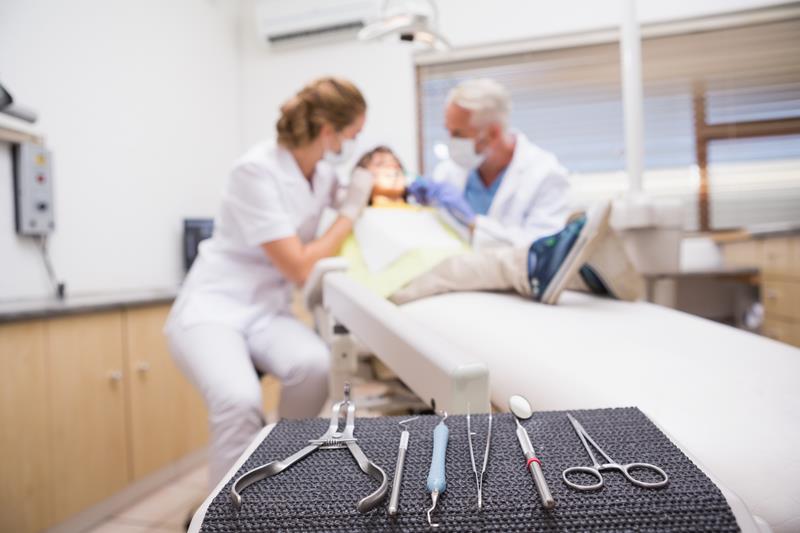
Good Diet
Here at Galdiano Dentistry, we are dedicated to your child’s dental health and diet.
Though many parents worry about their child’s weight, they don’t think twice about what their child’s diet is doing to his or her dental health. Your child needs to have healthy eating habits to ensure that his or her dental health is the best it can be. Just by watching what your child eats, you can decrease the amount of decay and gum disease he or she will develop.
The American Dental Association recommends avoiding foods high in sugar and other foods that can cause cavities.
The American Dental Association has several recommendations for a healthy diet. They suggest drinking plenty of water instead of sugary drinks and avoiding sugary foods and snacks between meals. You should teach your child mindful eating–eating a balanced diet full of nutrients from each food group, including whole grains, vegetables, dairy, and protein.
Besides eating well, your child needs to brush his or her teeth at least twice daily with a soft-bristled toothbrush. Flossing at least once a day and visiting the dentist at least twice a year will help ensure that your child’s mouth is as healthy as possible.
If you have any questions about your child’s dental health and diet, don’t hesitate to contact us today at (760) 966-0800.
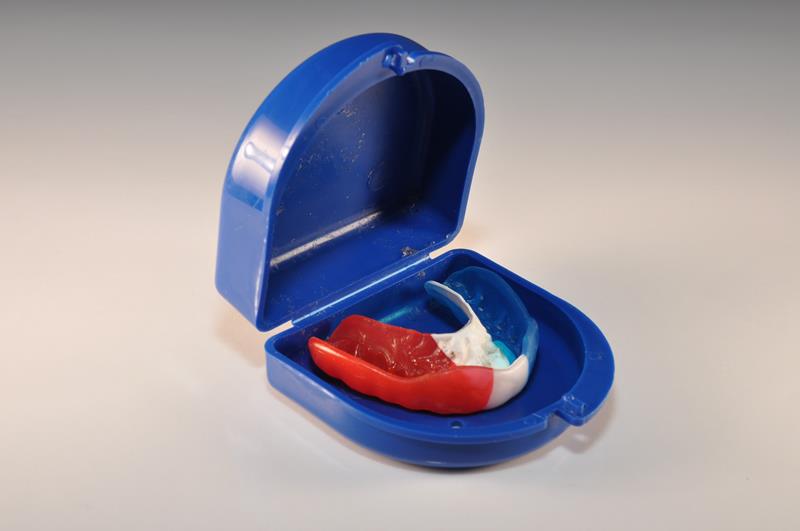
Mouth Guards
Here at Galdiano Dentistry, we are proud to offer nightguards and mouthguards to our patients.
Mouthguards are used to protect your child’s teeth and mouth.
Children may grind their teeth at night, which can cause a lot of damage. It is often beneficial for them to wear a mouthguard at night.
Mouthguards are also helpful during sports activities. They can help protect your child’s teeth and jaw from any potential damage from accidents like a blow to the face.
Whether or not the sport your child plays is high-impact, wearing a mouthguard might be helpful in case your child clenches his or her teeth during the game.
There are many types of mouthguards. Some are pre-formed while others are customized to fit a child’s teeth and jaw. Most mouthguards are used only on the top teeth, though some children need to have mouthguards on both their top and bottom teeth.
After a thorough examination, we would be happy to discuss your options so you can protect your child’s teeth from grinding at night and damage during sports activities.
To learn more about mouthguards and how we can care for your child’s teeth, please contact us today at (760) 966-0800.
Request an Appointment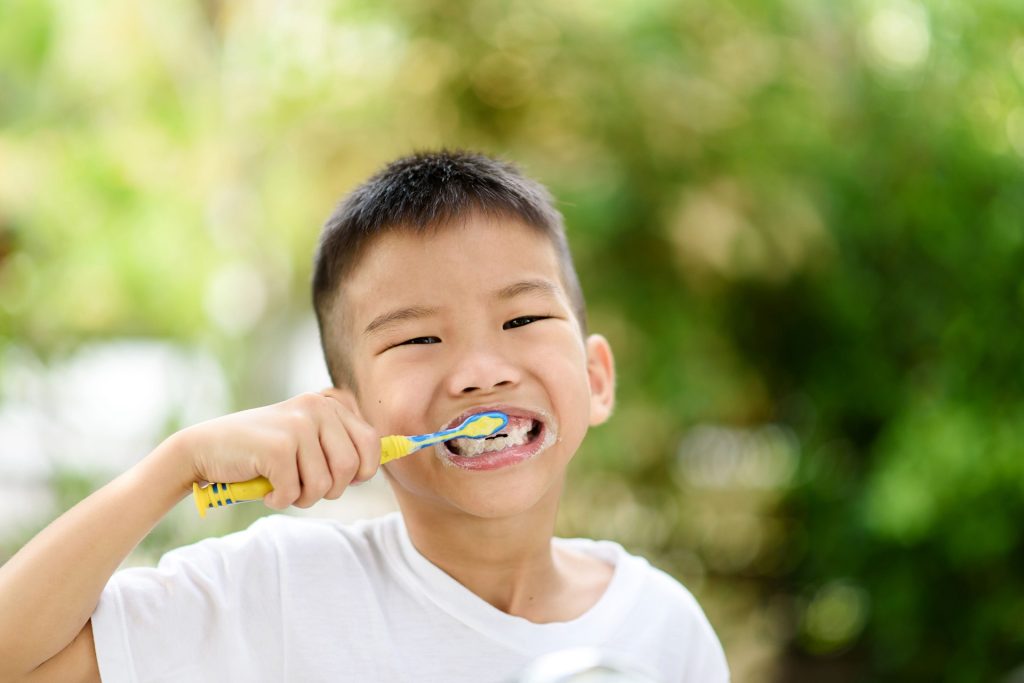
Dental Radiographs (X-Rays)
Here at Galdiano Dentistry, we are proud to offer dental examinations and x-rays to our patients.
We truly believe that regular dental examinations are important in order for your child to have good dental health and a smile of which he or she can be proud. We start by doing a professional cleaning, removing all of the bad tartar and other buildup on your child’s teeth.
We then do an examination, looking to catch and fix any problems before they become bigger ones. We examine each tooth, looking for any signs of decay, damage, or any other problems, such as signs of infection. We want to correct any problems your child may have before they get any worse.
X-rays help us look inside your child’s teeth for problems invisible to the naked eye. We can often diagnose cavities much more quickly with an X-ray. They are also helpful for finding any gum or teeth problems that we need to address.
During your child’s visit, we will also talk about good home care. We believe what you do at home really affects your child’s teeth. For this reason, we will acknowledge any areas on which you need to concentrate so your child can have a healthy smile.
If you have any questions or would like to schedule an appointment, don’t hesitate to contact us today at (760) 966-0800.
Request an Appointment
Early Orthodontic Treatment
We truly believe that good dental health starts early. Children need to learn the proper way to care for their teeth even at a young age. They need to brush their teeth twice daily and floss at least once daily (though they will probably need help with this).
It is also important for children who are growing to see the dentist regularly. We like to professionally clean their teeth, removing all of the tartar and plaque that may be building up. We then polish them so that they shine. For most children, we also offer a fluoride treatment, which helps their teeth continue to be strong.
If your child has a problem with overcrowding, bad bites, or anything else, we will start to develop a treatment plan to fix whatever the issue is. The sooner we start to fix the problems, the easier they will be to treat. We may not have to be as aggressive in treating a problem if we begin early, and you should see results fairly quickly.
Once your child has been treated, you may notice that he or she is able to eat and speak better. Though your child might not have told you, he or she might have been in pain, so you may see quite a difference with treatment. Be sure to schedule your child’s dental appointments regularly and work with him or her on practicing good oral care at home to ensure he or she has a healthy mouth right from the start!

Fluoride
Here at Galdiano Dentistry, we are dedicated to the prevention of tooth decay.
We believe that fluoride works well to strengthen children’s teeth. It also has been shown to help prevent tooth decay in people of all ages.
For this reason, the American Dental Association, American Academy of Pediatrics, and the American Medical Association believe that topical fluoride is necessary for good oral health.
Because of this, you may be wondering if your child needs fluoride treatments. Often water is enhanced with fluoride, so additional fluoride treatments are not necessary. However, if your water is not enhanced with fluoride, your child may need fluoride treatments. Your child may also need a fluoride treatment if he or she has symptoms like receding gums. You may also want to have your child treated if he or she wears braces or is taking medications that cause dry mouth.
Fluoride treatments can be completed at your child’s routine dental appointment. They are painless and quick, taking only a few minutes. When performing the treatment, your child’s dentist will apply gel, foam, or varnish on your child’s teeth. Treatment works best if it is done one to four times a year.
You may wonder what else you need to do in addition to getting your child regular fluoride treatments. The American Dental Association recommends drinking fluoridated water and using a toothpaste with fluoride.
If you have any questions about fluoride and your child’s dental health, don’t hesitate to contact us today at (760) 966-0800.
Request an Appointment
Pacifiers and Thumb Sucking
Here at Galdiano Dentistry, we are dedicated to your children’s oral health.
We all know how soothing pacifiers can be for small infants. Pacifiers can comfort them and help them fall asleep. As parents take away the pacifiers, we often see thumb and finger sucking start. This is quite natural but can be harmful to children’s mouths.
Excessive sucking can cause the front teeth to come in crooked. If the sucking continues, your children’s bites may be off. Their jaws and bones may not grow properly and require extensive dental care to fix (if that is even possible).
To help your children stop these habits, you need to be very watchful. Reward them for not sucking their thumbs, especially in stressful situations. If you have a very anxious child, you need to find other ways to help him or her deal with anxiety.
Many parents place their children’s fingers in socks to stop the sucking. In bad cases, a dentist can help. There are mouthpieces that discourage sucking, or we can prescribe a medication to put right on the thumb.
If you have any questions about thumb and finger sucking or pacifier habits, don’t hesitate to contact us today at (760) 966-0800.
Request an Appointment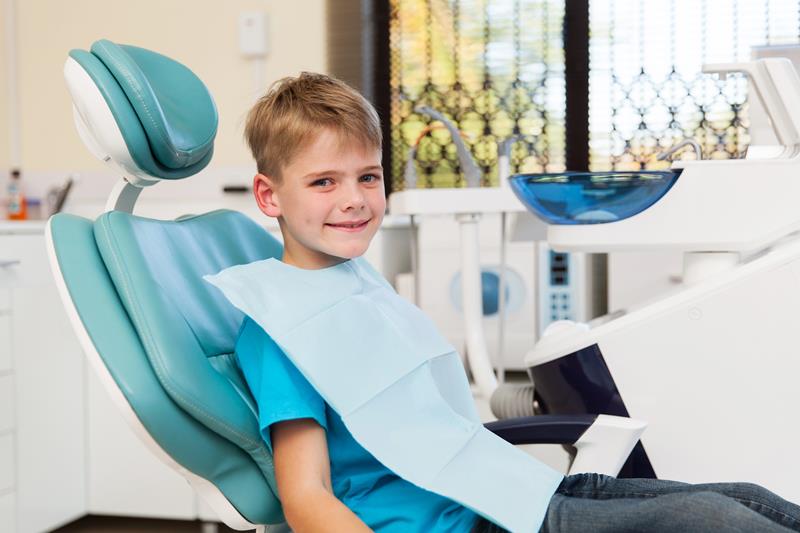
Dental Emergencies
We are here for you at Galdiano Dentistry, especially during emergencies.
It is very important to be prepared in case your child has an emergency. Even though we wish that they wouldn’t, emergencies do happen. Being educated and knowing what to do in an emergency can be the difference between losing and saving a tooth. You also need to know your dentist’s phone number.
You need to contact us right away if you are having an emergency! If we are not open, go to the nearest emergency center.
If your child loses a permanent tooth, it is important to keep it wet until you get to the dentist. If possible, place it back into the socket. If that is too painful, have your child keep it between his or her cheek and gums or place it in milk to try to save it. Please do not put the tooth in your child’s mouth if you are concerned that he or she might swallow it.
In the case of a cracked tooth or bitten tongue or lip, always have your child rinse out his or her mouth with warm water. A warm compress will help reduce swelling. If your child has something stuck in his or her teeth, gently use floss to get it out. You shouldn’t try to remove it with something sharp. To avoid Reye’s syndrome, children should not be given aspirin for pain.
Children should always wear a mouthguard during sports and other physical activities to protect their teeth. They should avoid chewing hard food like hard candy, ice, and popcorn kernels. These foods can break teeth. Both children and adults should use scissors instead of their teeth to cut or tear things.
If you have a dental emergency, contact us immediately at (760) 966-0800.
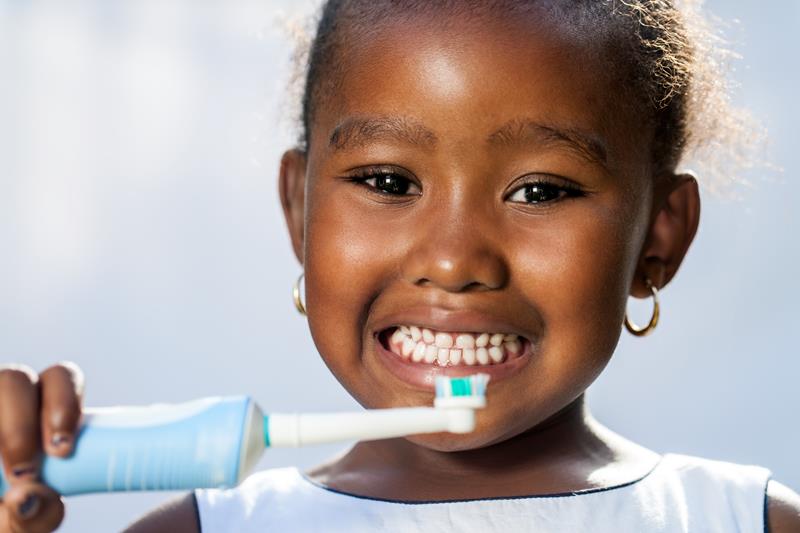
First Visit
Here at Galdiano Dentistry, we are proud to take care of your child’s dental health.
The American Academy of Pediatric Dentistry (AAPD) recommend that children have their first dental appointment when they are close to their first birthday.
Many people put off a child’s first dental appointment because it can be quite stressful for both the child and the parents. However, in order to start a child off right on the road to good dental health, it is important that parents overcome their own phobias and make sure that the first visit goes well. They need to remain positive in order to ensure their child has a good visit every time he or she goes to the dentist.
Pediatric dentists also want your child’s visits to go well. They receive extensive training in child psychology. They make sure their offices are inviting. They choose colorful paints for the walls. They have a selection of games, toys, and books for when children are waiting to be seen. They hire staff members who are good with children so that each visit goes well.
Parents need to stay positive. They need to tell their children that the dentist keeps their teeth healthy. They should not use words like cavities, decay, drill, needles, or any other scary words. Even dentists try to avoid those words during the visit to make sure it remains positive.
If parents have other children in addition to the one being seen, it can be beneficial to leave them at home. Too much commotion in the office can make it hard for a child to sit still. It may also help to bring another adult along, that way one adult can hold the child while the other listens and asks questions.
It is always helpful if a child knows what to expect during a visit. There are many books on the topic that you may want to read with your child to help reduce any anxiety he or she may be feeling. The Berenstain Bears, Dora the Explorer, and even Elmo are all featured in books about going to the dentist.
For their first visit, your child will get to meet and become acquainted with the dentist. Then the dentist will look at the development of his or her teeth and jaws. The dentist may ask questions to figure out the child’s overall health history. After that the dentist will determine the health of the existing teeth and gums. Finally, the dentist will answer any questions and help you formulate a home care regimen for your child.
If you have any questions or would like to set up your child’s first dental visit, don’t hesitate to contact us today at (760) 966-0800.
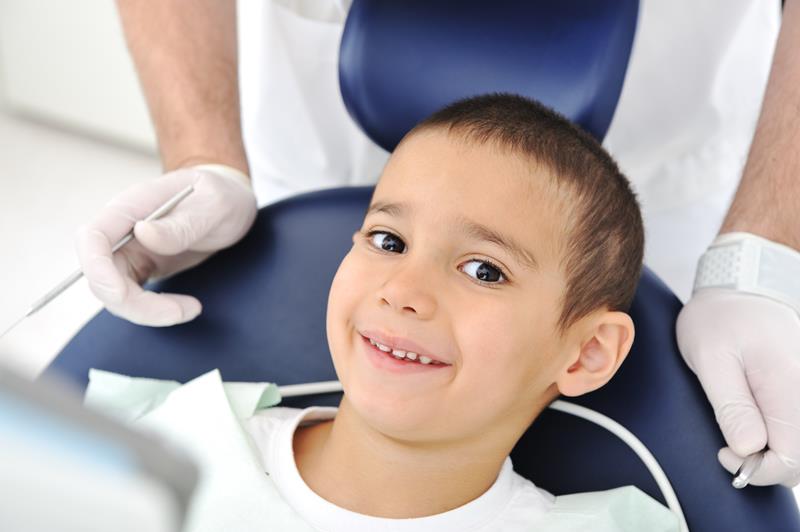
How to Prevent Cavities
Here at Galdiano Dentistry, we are dedicated to preventing cavities in children.
Though most adults don’t think about it, it is quite common for children to get cavities. There are two reasons that cavities develop so frequently in children. First, children often do not brush their teeth the way they should. Second, they eat sugary diets and drink sugary beverages.
Cavities can be very painful for children. If left untreated, they can lead to decay and periodontitis. For this reason, parents need to make sure their children are eating well and taking care of their teeth at home. It is also important that children visit the dentist twice a year to help prevent cavities and maintain good oral health.
Even though your children will lose their baby teeth, these teeth are still important and need to be taken care of. Children need to brush at least twice a day and floss at least once a day. They also need to visit their dentist twice a year for a professional cleaning. During those visits, the dentist may seal their teeth. The dentist may also use a fluoride supplement to strengthen their teeth.
Even if you take good care of your children’s mouths, you need to keep an eye out for cavities. Though large ones can be painful, your children may not notice the smaller one. The sooner cavities are caught, the easier they are to treat.
For this reason, you should keep an eye out for symptoms of cavities. Children may complain about a toothache or general pain in their mouths. You may notice sensitivity to cold or hot foods. Some children wake up in the middle of the night crying from the pain.
Sometimes cavities are so small that dentists need to use x-rays to find them. If you think that your child has a cavity, it is important to have him or her seen right away.
There are many ways to prevent cavities. Regular dental visits and good home care are necessary for good health. You should also watch your children’s diet. Cut out sugar, sticky foods, and other snacks and drinks that can cause cavities. Snacking also exposes the teeth to extra sugar during the day. It is important to not give your children drinks at bedtime because the sugar in the drinks will just sit in your children’s mouths all night long.
Sippy cups also have been known to cause cavities because the sugary liquid in them sticks to children’s teeth. Pacifiers can also cause bacteria to grow in children’s mouths. They should be washed thoroughly in a sink not in your own mouth, which transfers bacteria. You should never dip a pacifier in anything even in an effort to calm a child. Honey or any other sugary substance will stick to children’s teeth and allow cavities to form.
The best way to maintain your children’s good dental health is regular brushing and flossing. They also need to visit the dentist regularly to make sure they don’t have any cavities or to get any cavities they do have taken care of right away.
If you have any questions about preventing cavities, don’t hesitate to contact us today at (760) 966-0800.

Sippy Cups
Here at Galdiano Dentistry, we are dedicated to the health of your children’s teeth.
Frequent and prolonged use of sippy cups does lead to increased tooth decay in toddlers. Sippy cups are wonderful at what they are supposed to do, which is to help toddlers transition from using bottles to using regular cups. They are also great because they don’t spill when they are dropped or knocked over. However, many parents continue to use them even as their children age. Because of this, more children are being diagnosed with pediatric cavities and baby bottle cavities.
The American Academy of Pediatric Dentistry (AAPD) recommends that parents make a child’s first “well-baby” dental examination six months after the first tooth arrives. Dentists use this time to talk to parents about good oral care at home, eliminating sippy cups, and getting rid of unwanted oral habits (like thumb sucking).
Sippy cups can be used as soon as your children are able to hold them. However, as soon as they can handle an adult-sized cup (usually by the time children are about one year old), you should stop using sippy cups.
While sippy cups are necessary, there are ways to prevent decay while your children are using them. Try to give your children water instead of sugary liquids in them. Don’t let your children take cups to bed, and don’t give them cups to soothe them.
You should also monitor your children’s drinking habits. Children should not be drinking continuously from the cup. If you want to give your children sugary drinks, you should do so only during meal times when their saliva is high, helping to remove the sugary solution from their mouths. Also, make sure that you clean the sippy cup regularly. You don’t want bacteria to grow inside them.
Sippy cups, by themselves, do not cause decay. The main problem is what is inside of them. Many parents fill them with sugary liquids like breast milk, formula, juice, soda, and other drinks that promote decay.
Sippy cups are meant to allow only a small amount of drink out at a time. Because of this, the sugar in the liquid stays in the mouth and around the teeth. Bacteria feed on sugar, producing acids which attack the tooth enamel. As the enamel weakens, it becomes susceptible to decay.
Because of this, it is really important for your children to visit their pediatric dentist twice a year. We will look for signs of cavities (especially between the teeth). We will also monitor the development of the teeth to make sure that your children have healthy mouths.
Since sippy cups are important for parents, the American Dental Association (ADA) has announced that some are better than others. They recommend avoiding ones that claim they won’t spill because this means that in order to get a decent drink, your children have to keep sucking and sucking. Then the sugar in the drink will continue to swirl around their mouth and teeth.
They also recommend using cups with spouts because they promote good drinking habits. They are not just bottles for older children.
You may want to get larger sippy cups, which promote the use of two hands and thus make transitioning to a cup easier.
If you have questions or concerns about tooth decay or the use of sippy cups, don’t hesitate to contact us today at (760) 966-0800.
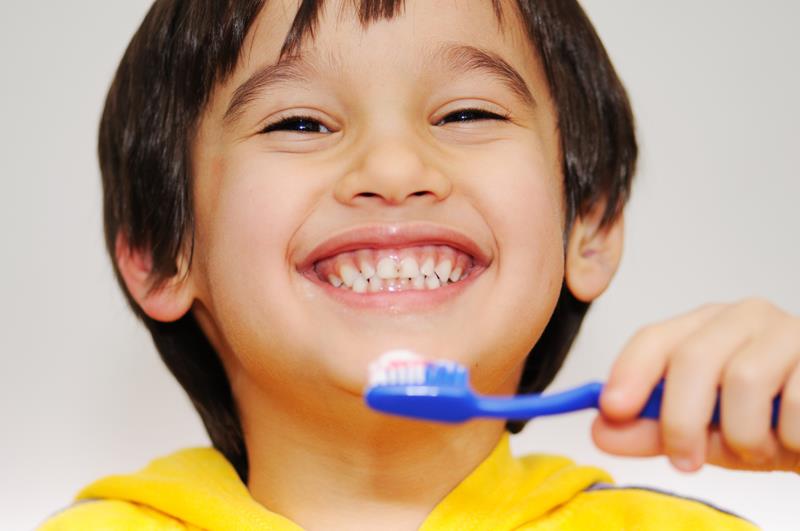
Xylitol – Reducing Cavities
Here at Galdiano Dentistry, we are dedicated to the health of your children’s mouths. We are proud to offer xylitol, which helps reduce cavities.
Unfortunately, tooth decay is common even though it is highly preventable. If decay is left untreated, it is painful and can really affect the teeth. Decay can make eating and speaking more difficult and change the look of your mouth.
Some children are more likely to suffer from tooth decay even with routine brushing and dental appointments. Because of this, the American Academy of Pediatric Dentistry (AAPD) believes in the benefits of using xylitol to help reduce tooth decay in children.
Since a cup of berries has less than one gram of xylitol, it can be hard to get children to eat enough xylitol to make a difference. Xylitol is also used as a sugar substitute found in gum and other health foods. No other sugar substitute offers the same benefits.
However, eating more than the recommended amount does not mean that your children will get more protection. It is recommended that you give your children only the correct daily amount to fight cavities.
Some children are more likely to get cavities because of their oral care habits and diet (especially if their diet is high in sugar and carbohydrates). Some children’s teeth are more resistant to buildup than others.
The bacteria left in your children’s mouths feeds off of sugars and carbohydrates. The bacteria attacks their tooth enamel, leaving it weak and more susceptible to cavities.
Xylitol is used to neutralize the acid which helps to keep your children’s enamel strong. This helps to decrease the amount of cavities they get. Xylitol also helps to get their saliva moving to clean away more food, bacteria, and plaque.
There are times when xylitol should be used with fluoride to remineralize teeth and strengthen the enamel so it is less likely to form cavities.
Though there are many benefits of chewing xylitol gum, young children are not able to do so. However, if you have a child who is still nursing, he or she can get benefits through breast milk!
Once your children are a little older, they can get xylitol in fruits and vegetables. You may also want to use it as a sugar substitute. When your children are old enough, it can be beneficial for them to chew gum with xylitol in it.
If you have questions or concerns about xylitol or tooth decay, don’t hesitate to contact us today at (760) 966-0800.
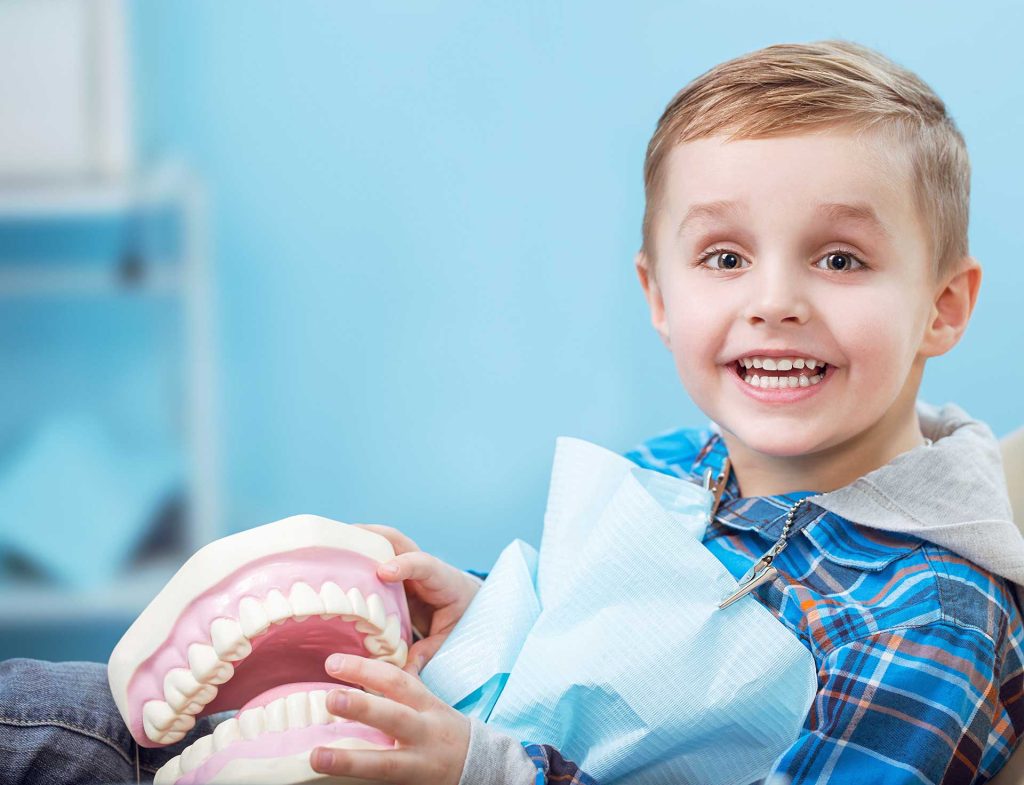
Pediatric Dental Appliances
Here at Galdiano Dentistry, we are proud to offer pediatric dental appliances for our patients.
Though many people think of teenagers wearing braces when they hear the phrase “dental appliances,” there are many other appliances that work well for younger children. Some appliances are used to prevent problems while others are used to treat them.
Though it can be hard to get young children to wear their appliances, it is worth it. The appliances can prevent damage to the teeth, and if worn correctly, your children may not need as much treatment in the future as they would otherwise.
Mouthguards should be worn any time that your children engage in activities, such as sports or other dangerous activities, that may cause harm to their teeth. We can get your children customized mouthguards, though many people like to get a thermoplastic “boil-and-bite” mouthguard from a sporting goods store.
Mouthguards can also be helpful for children who grind their teeth at night. It helps to protect their teeth and can even reduce jaw pain.
Space maintainers are used when children lose their baby teeth early. This sometimes happen due to trauma or even decay. When a tooth is lost, other teeth will shift to fill in the space. Though this sounds good, it actually can cause a lot of spacing and alignment problems when the adult teeth start to come in. Because of this, spacers are used to fill in the space where the tooth is missing so that the other teeth stay in place.
There are two types of spacers: fixed and removable. Fixed spacers use a “band and loop,” “crown and loop,” or “distal shoe” type of spacer to fill the space where the tooth is missing. Fixed spacers are usually metal and can last a long time. There are times when we can place an enamel tooth into the space to improve the smile’s appearance.
Removable space maintainers are not used often. They work like orthodontic retainers, placing special plastic parts in the spot where the tooth is missing.
We also offer thumb-sucking appliances for children who don’t outgrow this bad habit. Children who continue to suck their thumbs after they are five or six can suffer complications such as impacted and misaligned teeth. An appliance called a “palatal crib” has the ability to stop thumb sucking immediately.
Because an appliance adheres to the roof of the mouth, it prevents the thumb from reaching it. The thumb touching the roof of the mouth is what children find satisfying about thumb sucking. So the appliance stops the nasty habit quickly. There are several variations of thumb-sucking appliances available depending on the child’s age.
Expansion appliances are used to fix overbites and crossbites. They stretch and widen the arch so that the teeth can be realigned correctly. They are made for each individual child and can be attached to the inside or outside of the teeth.
Expansion appliances can also be helpful for children who need cleft palate surgery.
Bionator devices are used for children whose jaws are not growing in proportion to each other. The device positions the lower jaw forward so that the teeth will line up properly. This helps prevent children from needing as much orthodontic care in the future as they would otherwise need. It also promotes natural-looking alignments.
If you have any questions about dental appliances, don’t hesitate to contact us today at (760) 966-0800.
Tobacco Use
Here at Galdiano Dentistry, we are proud to offer substance abuse and tobacco counseling.
Whether you are 15 or 60 years old, quitting an addiction can be hard work. We understand this, and that is why we help people of all ages put an end to their substance abuse issues.
Our qualified staff has completed numerous courses and understands the psychological effects of substance abuse and tobacco. We are here to listen to you, understand why you have turned to this, and give you the tools to get back to the life you once knew.
Tobacco can be extremely hard on your mouth and gums. We are here to help get your mouth back to how it was prior to your tobacco use. We love helping all people and encourage you to reach out to us to get started on your road to health.
If you have any questions about substance abuse and tobacco counseling, Galdiano Dentistry would love to assist you. Please do not hesitate to reach out to us at (760) 966-0800.
Request an Appointment